"Wo hu le!" shouted Miguel after winning a recent game of mahjong hosted by the Global Times Metro Shanghai. The Spaniard studies at Fudan University for his master's and is one of a growing number of foreigners in Shanghai who have become experts of this ancient Chinese game. Miguel was first introduced to mahjong after accidentally stumbling into a venue in Xiamen that he thought served tea; after realizing it was a mahjong parlor, he tried his hand and quickly became addicted. Today he is a rising mahjong master.
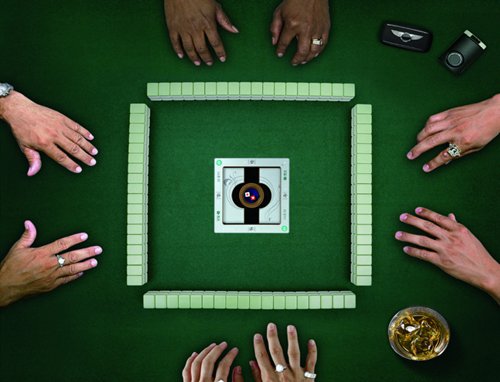
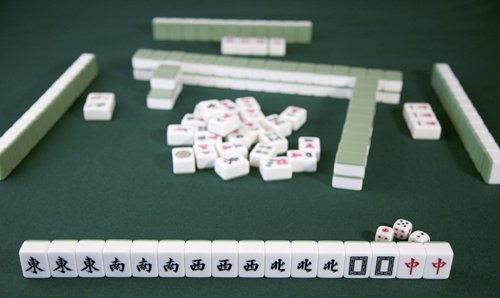
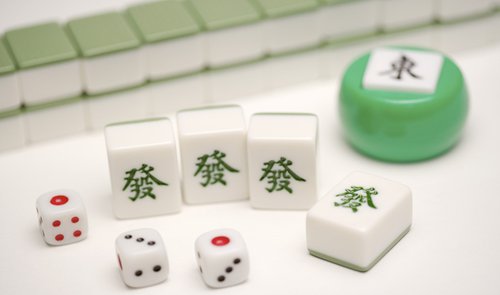
There is a growing number of foreigners in Shanghai who have become experts of the ancient Chinese game mahjong. Photos: nipic.com
Mahjong, a tile-based game that originated in the Qing Dynasty (1644-1911), isn't for everybody. Players must have at least a cursory understanding of the Chinese language to learn all the characters of the game's 144 tiles. "It's different and difficult, but this makes it all the more appealing to learn," said Miguel.
The rules are even more complex than the language. Each player initially receives 13 tiles, then draws and discards new tiles until they complete a hand using the 14th drawn tile to form four groups and a pair.
Essentially, one must make the most number of groups and pairs while also preventing other players from doing so.
During a mahjong game hosted by the Global Times Metro Shanghai, Miguel's mate, Thomas from Germany, said that one of the biggest obstacles to learning mahjong is to unlearn Western-style strategic games.
"It was a little difficult at first, because in Western countries we're more used to chess," Thomas said.
Also a student at Fudan University, Thomas was first introduced to mahjong by his Chinese-language teacher back in Germany.
"When the tiles are faced down, the risk is that you don't know if they are useful for another player," said Thomas.
Sebastian from Costa Rica, an international business major at Shanghai University of Finance and Economics who spends his free time playing mahjong, also attended the same game and said he frequently encounters cheaters when playing mahjong with locals. "They always win very fast; how can they win three times in a row?"
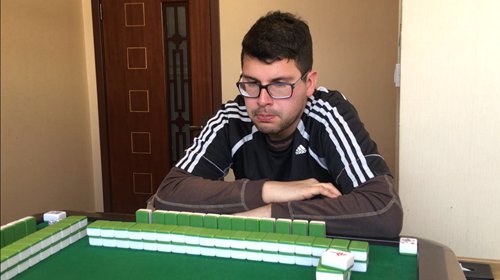
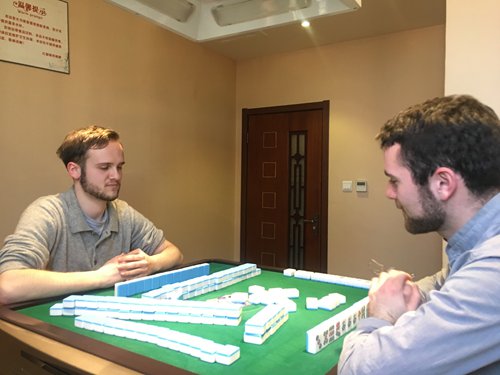
(Clockwise from top) Sebastian, Miguel and Thomas play a round of mahjong hosted by the Global Times Metro Shanghai. Photos: Qi Xijia/GT
Though Chinese universities discourage students from playing games such as mahjong lest they become addicted to gambling, Miguel believes playing mahjong, which requires four players, is a "common ground" and a great way to get to know locals while assimilating into Chinese society.
"If you want to meet Chinese, you should do things that Chinese people do. I like mahjong because at parties you don't have enough time to get to know people, but with mahjong you play for hours and end up talking about many different topics. So I really like the social aspect of this game," he said.
Miguel often plays with Chinese students at Fudan but has become frustrated with their growing dependency on virtual mahjong games played on smartphone apps.
"There's a WeChat group for mahjong amateurs at Fudan, but they only want to play on their phone, so I got out of the group. I prefer playing in person," he said.
When he does get together with other Chinese for a live game, Miguel says he is careful about instituting a rule against playing for money. "If we gamble, then Chinese players always suddenly become serious."
The Spaniard said that while his Chinese counterparts around the mahjong table are usually kind and understanding about his language and cultural barriers, winning remains their priority and they will not hesitate to try to beat him.
"I never met any Chinese who let a foreigner purposely win at mahjong. They'll invite me to play, treat me to tea or something, but they won't deliberately let me win. I think that Chinese people love to win," he laughed.
